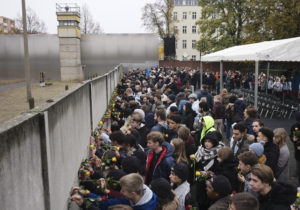Why the Rest of Europe Isn’t Happy With France and Germany
The European Union's leaders, Germany and France, decided Oct. 30 to try to change the EU's Lisbon Treaty. This is a highly charged and divisive move.PARIS — The European Union’s leaders, Germany and France, decided Oct. 30 to try to change the EU’s Lisbon Treaty. This is a highly charged and divisive move. While the Germans and French want important changes, a large number of the other 25 members do not. The Irish legally can’t agree to any substantial change in their adherence to the EU without a referendum, which frightens the rest as opening Pandora’s box.
Angela Merkel’s Germany insists on change because of the euro zone debt problem, which has the German electorate highly upset — for bad reasons. This unrest threatens Chancellor Merkel’s center-right governing coalition.
The public, and many among Germany’s political elite, are upset because of what the international press insists upon describing as the EU (or as the Germans like better to say, the German) “bailout” of Greece from its debt crisis earlier this year. The Germans want a permanent EU bailout fund that will spare them from again being called on to solve future EU member failures. They may also want — the details of their demands remain unclear, probably even to Germans — a permanent institutional arrangement for debt restructuring or rescheduling, with rules and automatic punishment for sinners.
This would be more plausible if, in fact — as the Financial Times again put it last weekend — the question were really one of “sovereign bailouts … largely funded by European taxpayers.”
“Funded” is an equivocal word, but seems to be interpreted by the German voter (and German politicians) to mean “paid for” with money never to be seen again. The thrifty Germans seem to think that their taxes and savings are being taken away to subsidize profligate and indolent Greeks, lying about on beaches.
There are two things to be said about this. The first is that no one is giving away anything to the Greeks. The current European fund operates in conjunction with the IMF to lend money to Greece if necessary, following time-honored rules established by the IMF for all countries requiring debt relief. Greece will be no exception and will have to pay back the money with interest.
As the conservative French daily, Le Figaro, said Monday, those who purchase state bonds, reassured by the presence of the IMF arrangement, run some risk “that their investment may decline in value and have to be rescheduled over time,” but this is the case with any enterprise in difficulty, and in the Greek case, “there is no risk of failure or bankruptcy.” The EU economy, as many seem to forget, remains the most powerful and successful in the world, despite the international financial crisis (imposed on the world, one must note, by feckless and frequently crooked American high finance, and by American government deregulation and negligence).
The European Central Bank’s president, Jean-Claude Trichet — a man of orthodox economic views if ever one existed — stood against both Merkel and his fellow Frenchman, President Nicolas Sarkozy, in arguing that discussing the debt problem in the dramatic terms used at the meeting Thursday, where the German and French leaders demanded Lisbon Treaty revision, deters private investors in Europe, pushes up interest rates and consequently adds to the burdens of the indebted countries.
The second problem is deeper, more subtle, and more important. The EU started out as a method for preventing a fourth Franco-German war, and for promoting permanent reconciliation, rapidly joined by Italy and the Benelux countries. It has for complex and fundamentally generous, if not always prudent, reasons turned itself into an organization of all of the western and Balkan European states.
A glance at history demonstrates that these have for centuries suffered rivalries, religious and dynastic conflicts, ethnic, economic, territorial and trade wars, consuming, as someone has said, a great deal more history than they found it comfortable to digest.
We have in fairly recent years seen the former Yugoslav nations — all ethnically kindred and linguistically linked, but divided by religion and territorial rivalries — throw themselves upon one another with a savagery unknown since the Nazi genocidal murder and pillage of what Germany’s leadership 65 years ago considered the inferior “races” of Europe.
The EU has been a heroic effort to put a permanent end to such things. Europe is a place of immense divergences and historical grievances, and a multitude of cultures and ways of life. The Greeks (and Irish) are not Germans, to put it mildly. In Greece and the Balkans, and in much of Catholic southern Europe, the state historically has been weak or absent, an insecure structure in which to conduct one’s life. Family usually has counted for far more.
The wealth of Greece today remains primarily tied to family, and to personal codes and structures of obligation, rather than to an impersonal state. In this respect, Greeks are the opposite of Germans, as are many of Europe’s new members. If Germany should behave as if all of them need to be lashed into line with Northern European Protestant norms of society and economy, there might soon no longer be a EU.
Visit William Pfaff’s website for more on his latest book, “The Irony of Manifest Destiny: The Tragedy of America’s Foreign Policy” (Walker & Co., $25), at www.williampfaff.com.
© 2010 Tribune Media Services, Inc.
Your support matters…Independent journalism is under threat and overshadowed by heavily funded mainstream media.
You can help level the playing field. Become a member.
Your tax-deductible contribution keeps us digging beneath the headlines to give you thought-provoking, investigative reporting and analysis that unearths what's really happening- without compromise.
Give today to support our courageous, independent journalists.






You need to be a supporter to comment.
There are currently no responses to this article.
Be the first to respond.